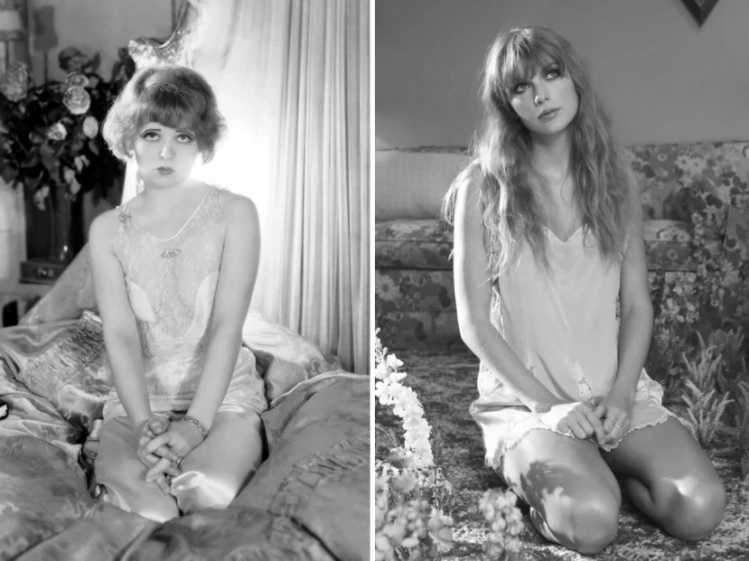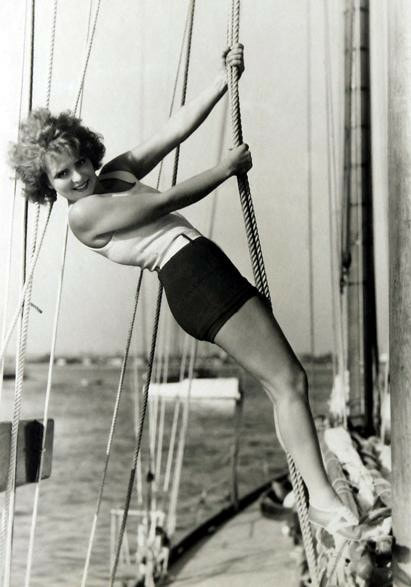
Only a few local historians and a small fan base are aware that the legendary Clara Bow was among the celebrities who spent time on the Eastern Shore long ago. But she did, in fact, own property on Taylors Island that she called “Happy Days,” where she threw infamously wild parties befitting her status as the Queen of Hollywood in the Roaring Twenties. Now, a modern legend, singer-songwriter Taylor Swift, has included a track titled “Clara Bow” on her 11th studio album, The Tortured Poets Department, and fans, critics, and scholars are trying to decipher the meaning of it.
In the song, Swift croons that she’s been compared to the movie star.
You look like Clara Bow
In this light, remarkable
All your life, did you know
You’d be picked like a rose?
 But something more has inspired Swift here, and there are various theories. First, though, a little background on the subject is in order.
But something more has inspired Swift here, and there are various theories. First, though, a little background on the subject is in order.
Clara Gordon Bow (1905-1965) competed in a nationwide acting contest in 1921. She was only 16, but she was “full of confidence, determination, and ambition,” reported Motion Picture Classic magazine, which added that she was “endowed with a mentality far beyond her years.”
This led Bow to the silver screen, and her performance in the movie It brought her international fame and the nickname “The It Girl.” She went on to appear in 46 silent films, including the first Best Picture Oscar winner, Wings (1927). Crowned the top box office draw in 1928, she also became the highest-paid movie actor at $35,000 per week. She was the #1 box office star again in 1929, the same year she made the transition to “talkies,” of which she made eleven.
At the peak of her stardom, Bow received over 45,000 fan letters in one month. Among her admirers were American gangster Al Capone and German Chancellor Adolf Hitler. Enthusiastic followers wore Clara Bow signature hats over Clara Bow hairstyles.
Fans also danced and smoked and partied like Bow, whose bohemian lifestyle was infamous. In the mid-20s, on her 300-acre Taylors Island property called “Happy Days,” she built a log cabin that was notorious for wild shindigs with bootleg liquor snuck onto the Eastern Shore during Prohibition. That property, 20 minutes southwest of Cambridge, is now Patriot Point, which is being developed as a retreat for wounded service members.
“My life in Hollywood contained plenty of uproar,” Bow said while reflecting on her career later. “I made a place for myself on the screen, and you can’t do that by being [Louisa May] Alcott’s idea of a Little Woman.”
She was always herself, brazen and confident in her sexuality, and perhaps that’s why so many men were drawn to her. These included actors Gary Cooper and Bela Lugosi, director Victor Fleming, and producer Howard Hughes, among others. Bow was engaged no fewer than six times, but she had trouble with commitment, complaining, “I really don’t care about men.” This all made her personal life endless fodder for the press, and wild rumors abounded, many of them untrue.
“Taylor Swift and Clara Bow have much in common,” wrote PBS.org’s Deirdre Clemente and Annie Delgado, “a meteoric rise to fame built on talent and hard work; a series of closely watched love affairs; and legal drama with managers, former friends, and the press. Both women redefined expectations of what an American woman could—and should—be.”
Bow’s great-granddaughter Nicole Sisneros described Bow and Swift to People magazine as “raw and amazingly talented artists.” And it’s obvious that the superstar singer has played up some of the parallels between her and the celluloid siren. There are photos of Swift styled much like portraits of Bow, and Taylor’s Schiaparelli look at the most recent Grammy Awards—complete with choker and pearl necklaces—echoed a similar ensemble of Bow’s.
But is there more to the song “Clara Bow” than these reflections?
Parade’s Jessica Sager called it an “ode to making it big and struggling with the trappings and pressures of fame and success.” And Stephanie Zacharek of Time said “the song is partly about self-possession and knowing the worth of your beauty, but perhaps even more about the worth others see in it—and their almost reflexive desire to market it.”
Equally as cynical is Bow biographer David Stenn, who supposed that Swift was inspired by the fact that the silent screen star “was both celebrated and condemned in the media in a way that male stars never were.” He added that “they build you up, and the only result of being built up is to be torn down.”
Swift obviously doesn’t want that last part for herself. She admits in the song:
I’m not trying to exaggerate
But I think I might die if it happened
Die if it happened to me
But Zacharek thinks the song “isn’t about Clara Bow the person at all, though it could be said to be about Clara Bow the vibe. Is it possible to be beautiful and charismatic to the point of possessing a kind of cosmic power that draws success to you?” Whatever the truth is, one can be certain that Clara Bow, once a regular in Dorchester County, has risen again in the 21st century, thanks to her admirer and successor, Taylor Swift.



You know that Patriot point is on mainland. Slaughter creek divides mainland from Taylors Island.